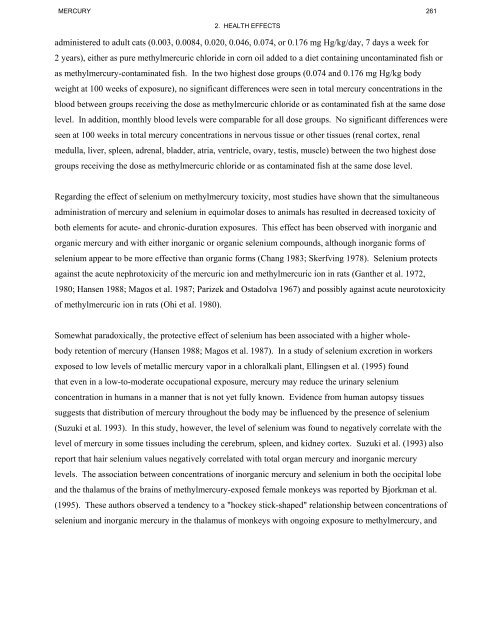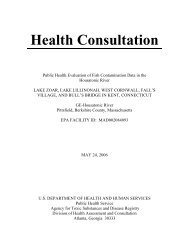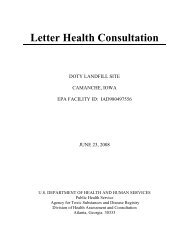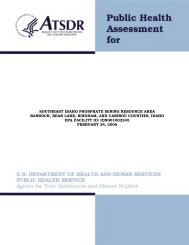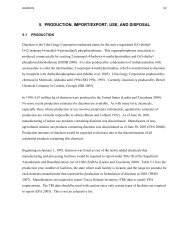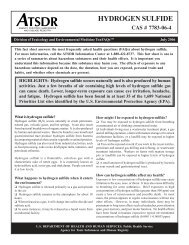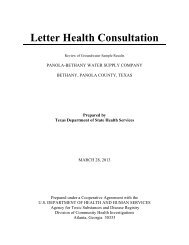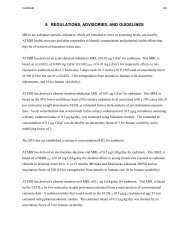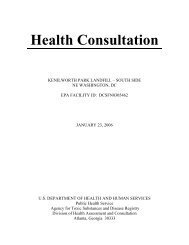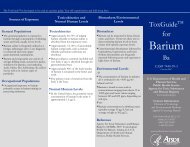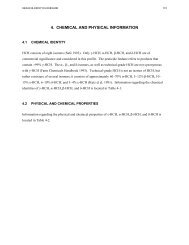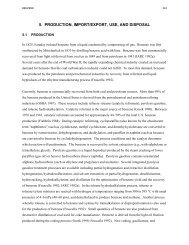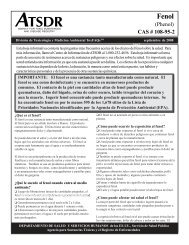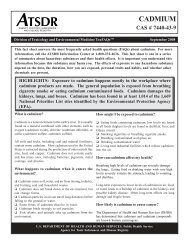- Page 1 and 2:
TOXICOLOGICAL PROFILE FOR MERCURY U
- Page 3:
MERCURY UPDATE STATEMENT A Toxicolo
- Page 8 and 9:
MERCURY Managing Hazardous Material
- Page 11:
MERCURY PEER REVIEW A peer review p
- Page 14 and 15:
MERCURY 2.2.3 Dermal Exposure .....
- Page 16 and 17:
MERCURY xvi APPENDICES B. ATSDR MIN
- Page 19 and 20:
MERCURY LIST OF TABLES 2-1 Levels o
- Page 21 and 22:
MERCURY 1. PUBLIC HEALTH STATEMENT
- Page 23 and 24:
MERCURY 1. PUBLIC HEALTH STATEMENT
- Page 25 and 26:
MERCURY 1. PUBLIC HEALTH STATEMENT
- Page 27 and 28:
MERCURY 1. PUBLIC HEALTH STATEMENT
- Page 29 and 30:
MERCURY 1. PUBLIC HEALTH STATEMENT
- Page 31 and 32:
MERCURY 1. PUBLIC HEALTH STATEMENT
- Page 33 and 34:
MERCURY 1. PUBLIC HEALTH STATEMENT
- Page 35 and 36:
MERCURY 1. PUBLIC HEALTH STATEMENT
- Page 37 and 38:
MERCURY 1. PUBLIC HEALTH STATEMENT
- Page 39 and 40:
MERCURY 1. PUBLIC HEALTH STATEMENT
- Page 41 and 42:
MERCURY 1. PUBLIC HEALTH STATEMENT
- Page 43 and 44:
MERCURY 1. PUBLIC HEALTH STATEMENT
- Page 45 and 46:
MERCURY 1. PUBLIC HEALTH STATEMENT
- Page 47 and 48:
MERCURY 1. PUBLIC HEALTH STATEMENT
- Page 49 and 50:
MERCURY 2.1 INTRODUCTION 2. HEALTH
- Page 51 and 52:
MERCURY 2. HEALTH EFFECTS This prof
- Page 53 and 54:
MERCURY 2. HEALTH EFFECTS bronchiti
- Page 63 and 64:
MERCURY 2. HEALTH EFFECTS A 39-year
- Page 65 and 66:
MERCURY 2. HEALTH EFFECTS effects o
- Page 67 and 68:
MERCURY Gastrointestinal Effects 2.
- Page 69 and 70:
MERCURY 2. HEALTH EFFECTS home as a
- Page 71 and 72:
MERCURY Renal Effects 2. HEALTH EFF
- Page 73 and 74:
MERCURY 2. HEALTH EFFECTS pathologi
- Page 75 and 76:
MERCURY Ocular Effects 2. HEALTH EF
- Page 77 and 78:
MERCURY 2. HEALTH EFFECTS the T-cel
- Page 79 and 80:
MERCURY 2. HEALTH EFFECTS In case r
- Page 81 and 82:
MERCURY 2. HEALTH EFFECTS A 27-year
- Page 83 and 84:
MERCURY 2. HEALTH EFFECTS The TWA m
- Page 85 and 86:
MERCURY 2. HEALTH EFFECTS reversibl
- Page 87 and 88:
MERCURY 2.2.1.5 Reproductive Effect
- Page 89 and 90:
MERCURY 2.2.1.6 Developmental Effec
- Page 91 and 92:
MERCURY 2. HEALTH EFFECTS acquiring
- Page 93 and 94:
MERCURY 2. HEALTH EFFECTS control s
- Page 95:
MERCURY 2. HEALTH EFFECTS compounds
- Page 125 and 126:
MERCURY 105 2. HEALTH EFFECTS chlor
- Page 127 and 128:
MERCURY 107 2. HEALTH EFFECTS diffe
- Page 129 and 130:
MERCURY 109 2. HEALTH EFFECTS chlor
- Page 131 and 132:
MERCURY 111 Musculoskeletal Effects
- Page 133 and 134:
MERCURY 113 Renal Effects 2. HEALTH
- Page 135 and 136:
MERCURY 115 2. HEALTH EFFECTS (dila
- Page 137 and 138:
MERCURY 117 2. HEALTH EFFECTS glome
- Page 139 and 140:
MERCURY 119 Dermal Effects 2. HEALT
- Page 141 and 142:
MERCURY 121 2. HEALTH EFFECTS The o
- Page 143 and 144:
MERCURY 123 2. HEALTH EFFECTS Organ
- Page 145 and 146:
MERCURY 125 2. HEALTH EFFECTS forge
- Page 147 and 148:
MERCURY 127 2. HEALTH EFFECTS occur
- Page 149 and 150:
MERCURY 129 2. HEALTH EFFECTS hypot
- Page 151 and 152:
MERCURY 131 2. HEALTH EFFECTS any e
- Page 153 and 154:
MERCURY 133 2. HEALTH EFFECTS in th
- Page 155 and 156:
MERCURY 135 2. HEALTH EFFECTS paral
- Page 157 and 158:
MERCURY 137 2. HEALTH EFFECTS as lo
- Page 159 and 160:
MERCURY 139 2. HEALTH EFFECTS Pregn
- Page 161 and 162:
MERCURY 141 2. HEALTH EFFECTS dysar
- Page 163 and 164:
MERCURY 143 2. HEALTH EFFECTS >12 p
- Page 165 and 166:
MERCURY 145 2. HEALTH EFFECTS Tempo
- Page 167 and 168:
MERCURY 147 2. HEALTH EFFECTS less
- Page 169 and 170:
MERCURY 149 2. HEALTH EFFECTS admin
- Page 171 and 172:
MERCURY 151 2. HEALTH EFFECTS Hg/kg
- Page 173 and 174:
MERCURY 153 2. HEALTH EFFECTS incre
- Page 175 and 176:
MERCURY 155 2. HEALTH EFFECTS is li
- Page 177 and 178:
MERCURY 157 2. HEALTH EFFECTS ulcer
- Page 179 and 180:
MERCURY 159 2. HEALTH EFFECTS patie
- Page 181 and 182:
MERCURY 161 2. HEALTH EFFECTS No st
- Page 183 and 184:
MERCURY 163 2.3.1.1 Inhalation Expo
- Page 185 and 186:
MERCURY 165 2. HEALTH EFFECTS was m
- Page 187 and 188:
MERCURY 167 2. HEALTH EFFECTS (1 mg
- Page 189 and 190:
MERCURY 169 2.3.1.3 Dermal Exposure
- Page 191 and 192:
MERCURY 171 2. HEALTH EFFECTS decli
- Page 193 and 194:
MERCURY 173 2. HEALTH EFFECTS prima
- Page 195 and 196:
MERCURY 175 2. HEALTH EFFECTS follo
- Page 197 and 198:
MERCURY 177 2. HEALTH EFFECTS methy
- Page 199 and 200:
MERCURY 179 2. HEALTH EFFECTS 1992;
- Page 201 and 202:
MERCURY 181 2. HEALTH EFFECTS side
- Page 203 and 204:
MERCURY 183 2. HEALTH EFFECTS pathw
- Page 205 and 206:
MERCURY 185 2.3.4 Elimination and E
- Page 208 and 209:
MERCURY 188 2. HEALTH EFFECTS worke
- Page 210:
MERCURY 190 2. HEALTH EFFECTS Rowla
- Page 213 and 214:
MERCURY 193 2. HEALTH EFFECTS 2.3.5
- Page 216:
MERCURY 196 2. HEALTH EFFECTS dosin
- Page 220 and 221:
MERCURY 200 2. HEALTH EFFECTS did o
- Page 226 and 227:
MERCURY 206 2. HEALTH EFFECTS reabs
- Page 228 and 229:
MERCURY 208 2. HEALTH EFFECTS Oral
- Page 230 and 231: MERCURY 210 2. HEALTH EFFECTS Strai
- Page 232 and 233: MERCURY 212 2. HEALTH EFFECTS enzym
- Page 234 and 235: MERCURY 214 2. HEALTH EFFECTS Recen
- Page 236 and 237: MERCURY 216 2. HEALTH EFFECTS 1995)
- Page 238 and 239: MERCURY 218 2. HEALTH EFFECTS autoa
- Page 240 and 241: MERCURY 220 2.5 RELEVANCE TO PUBLIC
- Page 242 and 243: MERCURY 222 2. HEALTH EFFECTS Pheny
- Page 244 and 245: MERCURY 224 2. HEALTH EFFECTS mercu
- Page 246 and 247: MERCURY 226 2. HEALTH EFFECTS nonst
- Page 248 and 249: MERCURY 228 2. HEALTH EFFECTS appre
- Page 250 and 251: MERCURY 230 2. HEALTH EFFECTS the M
- Page 252 and 253: MERCURY 232 2. HEALTH EFFECTS Emplo
- Page 254 and 255: MERCURY 234 C 2. HEALTH EFFECTS and
- Page 256 and 257: MERCURY 236 2. HEALTH EFFECTS Nakag
- Page 258 and 259: MERCURY 238 2. HEALTH EFFECTS • (
- Page 260 and 261: MERCURY 240 Supporting Studies 2. H
- Page 262 and 263: MERCURY 242 2. HEALTH EFFECTS and e
- Page 264 and 265: MERCURY 244 2. HEALTH EFFECTS the h
- Page 266 and 267: MERCURY 246 2. HEALTH EFFECTS the m
- Page 268 and 269: MERCURY 248 2. HEALTH EFFECTS Iraqi
- Page 271 and 272: MERCURY 251 2. HEALTH EFFECTS al. (
- Page 273 and 274: MERCURY 253 2. HEALTH EFFECTS The a
- Page 275 and 276: MERCURY 255 2. HEALTH EFFECTS The N
- Page 277 and 278: MERCURY 257 2. HEALTH EFFECTS NOAEL
- Page 279: MERCURY 259 2. HEALTH EFFECTS where
- Page 283 and 284: MERCURY 263 2. HEALTH EFFECTS expos
- Page 285 and 286: MERCURY 265 2. HEALTH EFFECTS direc
- Page 287 and 288: MERCURY 267 2. HEALTH EFFECTS 1982)
- Page 289 and 290: MERCURY 269 2. HEALTH EFFECTS died
- Page 291 and 292: MERCURY 271 2. HEALTH EFFECTS subst
- Page 293 and 294: MERCURY 273 2. HEALTH EFFECTS daily
- Page 295 and 296: MERCURY 275 2. HEALTH EFFECTS (thou
- Page 297 and 298: MERCURY 277 2. HEALTH EFFECTS 1983;
- Page 299 and 300: MERCURY 279 2. HEALTH EFFECTS more
- Page 301 and 302: MERCURY 281 2. HEALTH EFFECTS conce
- Page 303 and 304: MERCURY 283 2. HEALTH EFFECTS The a
- Page 305: MERCURY 285 2. HEALTH EFFECTS sensi
- Page 309: MERCURY 289 2. HEALTH EFFECTS mercu
- Page 313 and 314: MERCURY 293 More on Health Effects
- Page 315 and 316: MERCURY 295 2. HEALTH EFFECTS contr
- Page 317 and 318: MERCURY 297 2. HEALTH EFFECTS dimen
- Page 319 and 320: MERCURY 299 2. HEALTH EFFECTS Sible
- Page 321 and 322: MERCURY 301 2. HEALTH EFFECTS as fr
- Page 323 and 324: MERCURY 303 2. HEALTH EFFECTS syste
- Page 325 and 326: MERCURY 305 2. HEALTH EFFECTS for p
- Page 327 and 328: MERCURY 307 2. HEALTH EFFECTS More
- Page 329 and 330: MERCURY 309 2. HEALTH EFFECTS mercu
- Page 331 and 332:
MERCURY 311 2. HEALTH EFFECTS to ha
- Page 333 and 334:
MERCURY 313 2. HEALTH EFFECTS worke
- Page 335 and 336:
MERCURY 315 2. HEALTH EFFECTS When
- Page 337:
MERCURY 317 2. HEALTH EFFECTS Other
- Page 341 and 342:
MERCURY 321 2. HEALTH EFFECTS EEGs)
- Page 343 and 344:
MERCURY 323 2. HEALTH EFFECTS 2.8 I
- Page 345 and 346:
MERCURY 325 2. HEALTH EFFECTS the r
- Page 347 and 348:
MERCURY 327 2. HEALTH EFFECTS 3 yea
- Page 349 and 350:
MERCURY 329 2. HEALTH EFFECTS Neona
- Page 351 and 352:
MERCURY 331 2. HEALTH EFFECTS group
- Page 353 and 354:
MERCURY 333 2. HEALTH EFFECTS metab
- Page 355:
MERCURY 335 2. HEALTH EFFECTS prote
- Page 361 and 362:
MERCURY 341 2. HEALTH EFFECTS syste
- Page 363 and 364:
MERCURY 343 2. HEALTH EFFECTS Inhal
- Page 365 and 366:
MERCURY 345 2. HEALTH EFFECTS Addit
- Page 367 and 368:
MERCURY 347 2. HEALTH EFFECTS neede
- Page 369 and 370:
MERCURY 349 2. HEALTH EFFECTS from
- Page 371 and 372:
MERCURY 351 2. HEALTH EFFECTS condu
- Page 373 and 374:
MERCURY 353 2. HEALTH EFFECTS unkno
- Page 375 and 376:
MERCURY 355 2. HEALTH EFFECTS mercu
- Page 377:
MERCURY 357 2. HEALTH EFFECTS suppo
- Page 391:
MERCURY 371 4.1 PRODUCTION 4. PRODU
- Page 395 and 396:
MERCURY 375 4. PRODUCTION, IMPORT/E
- Page 397 and 398:
MERCURY 377 4. PRODUCTION, IMPORT/E
- Page 399 and 400:
MERCURY 379 5.1 OVERVIEW 5. POTENTI
- Page 406:
MERCURY 386 5. POTENTIAL FOR HUMAN
- Page 410 and 411:
MERCURY 390 5. POTENTIAL FOR HUMAN
- Page 415 and 416:
MERCURY 395 5. POTENTIAL FOR HUMAN
- Page 418 and 419:
MERCURY 398 5. POTENTIAL FOR HUMAN
- Page 420 and 421:
MERCURY 400 5. POTENTIAL FOR HUMAN
- Page 424 and 425:
MERCURY 404 5. POTENTIAL FOR HUMAN
- Page 426:
MERCURY 406 5. POTENTIAL FOR HUMAN
- Page 429 and 430:
MERCURY 409 5.3.2.3 Sediment and So
- Page 431 and 432:
MERCURY 411 5. POTENTIAL FOR HUMAN
- Page 433 and 434:
MERCURY 413 5. POTENTIAL FOR HUMAN
- Page 435 and 436:
MERCURY 415 5. POTENTIAL FOR HUMAN
- Page 437 and 438:
MERCURY 417 5. POTENTIAL FOR HUMAN
- Page 439:
MERCURY 419 5. POTENTIAL FOR HUMAN
- Page 444 and 445:
MERCURY 424 5. POTENTIAL FOR HUMAN
- Page 447 and 448:
MERCURY 427 5. POTENTIAL FOR HUMAN
- Page 449 and 450:
MERCURY 429 5. POTENTIAL FOR HUMAN
- Page 451:
MERCURY 431 5. POTENTIAL FOR HUMAN
- Page 454:
MERCURY 434 5. POTENTIAL FOR HUMAN
- Page 460:
MERCURY 440 5. POTENTIAL FOR HUMAN
- Page 463:
MERCURY 443 5. POTENTIAL FOR HUMAN
- Page 466:
MERCURY 446 5. POTENTIAL FOR HUMAN
- Page 471 and 472:
MERCURY 451 5. POTENTIAL FOR HUMAN
- Page 473 and 474:
MERCURY 453 5. POTENTIAL FOR HUMAN
- Page 477 and 478:
MERCURY 457 5. POTENTIAL FOR HUMAN
- Page 479 and 480:
MERCURY 459 5. POTENTIAL FOR HUMAN
- Page 481 and 482:
MERCURY 461 5. POTENTIAL FOR HUMAN
- Page 483 and 484:
MERCURY 463 5. POTENTIAL FOR HUMAN
- Page 485 and 486:
MERCURY 465 5. POTENTIAL FOR HUMAN
- Page 487 and 488:
MERCURY 467 5. POTENTIAL FOR HUMAN
- Page 489:
MERCURY 469 5. POTENTIAL FOR HUMAN
- Page 492 and 493:
MERCURY 472 5. POTENTIAL FOR HUMAN
- Page 494 and 495:
MERCURY 474 5. POTENTIAL FOR HUMAN
- Page 496 and 497:
MERCURY 476 5.8 ADEQUACY OF THE DAT
- Page 498 and 499:
MERCURY 478 5. POTENTIAL FOR HUMAN
- Page 500 and 501:
MERCURY 480 5. POTENTIAL FOR HUMAN
- Page 502:
MERCURY 482 5.8.2 Ongoing Studies 5
- Page 508:
MERCURY 488 6. ANALYTICAL METHODS i
- Page 513 and 514:
MERCURY 493 6. ANALYTICAL METHODS a
- Page 515:
MERCURY 495 6.2 ENVIRONMENTAL SAMPL
- Page 524 and 525:
MERCURY 504 6. ANALYTICAL METHODS N
- Page 526:
MERCURY 506 6. ANALYTICAL METHODS n
- Page 530 and 531:
MERCURY 510 7. REGULATIONS AND ADVI
- Page 532 and 533:
MERCURY 512 7. REGULATIONS AND ADVI
- Page 534:
MERCURY 514 7. REGULATIONS AND ADVI
- Page 546 and 547:
MERCURY 526 8. REFERENCES *Airey D.
- Page 548 and 549:
MERCURY 528 8. REFERENCES *Anttila
- Page 550 and 551:
MERCURY 530 8. REFERENCES *Bagedahl
- Page 552 and 553:
MERCURY 532 8. REFERENCES *Becker P
- Page 554 and 555:
MERCURY 534 8. REFERENCES *Bichler
- Page 556 and 557:
MERCURY 536 8. REFERENCES *Bowman C
- Page 558 and 559:
MERCURY 538 8. REFERENCES *Campbell
- Page 560 and 561:
MERCURY 540 8. REFERENCES *Chang LW
- Page 562 and 563:
MERCURY 542 8. REFERENCES *Clarkson
- Page 564 and 565:
MERCURY 544 8. REFERENCES *Crump KS
- Page 566 and 567:
MERCURY 546 8. REFERENCES *DOE. 199
- Page 568 and 569:
MERCURY 548 8. REFERENCES *Ellingse
- Page 570 and 571:
MERCURY 550 8. REFERENCES EPA. 1987
- Page 572 and 573:
MERCURY 552 8. REFERENCES *EPA. 199
- Page 574 and 575:
MERCURY 554 8. REFERENCES FDA. 1982
- Page 576 and 577:
MERCURY 556 8. REFERENCES *FSTRAC.
- Page 578 and 579:
MERCURY 558 8. REFERENCES *Gill GA,
- Page 580 and 581:
MERCURY 560 8. REFERENCES *Grandjea
- Page 582 and 583:
MERCURY 562 8. REFERENCES *Harada H
- Page 584 and 585:
MERCURY 564 8. REFERENCES *Hueter R
- Page 586 and 587:
MERCURY 566 8. REFERENCES Iverfeldt
- Page 588 and 589:
MERCURY 568 8. REFERENCES *Kanluen
- Page 590 and 591:
MERCURY 570 8. REFERENCES *Kuntz WD
- Page 592 and 593:
MERCURY 572 8. REFERENCES *Leroux B
- Page 594 and 595:
MERCURY 574 8. REFERENCES Livardjan
- Page 596 and 597:
MERCURY 576 8. REFERENCES *Malt UF,
- Page 598 and 599:
MERCURY 578 8. REFERENCES *Merck. 1
- Page 600 and 601:
MERCURY 580 8. REFERENCES *Morselli
- Page 602 and 603:
MERCURY 582 8. REFERENCES *Newland
- Page 604 and 605:
MERCURY 584 8. REFERENCES *Nordberg
- Page 606 and 607:
MERCURY 586 8. REFERENCES *Osol A,
- Page 608 and 609:
MERCURY 588 8. REFERENCES Pilgrim W
- Page 610 and 611:
MERCURY 590 8. REFERENCES *Regnell
- Page 612 and 613:
MERCURY 592 8. REFERENCES *Rosenman
- Page 614 and 615:
MERCURY 594 8. REFERENCES *Sato K,
- Page 616 and 617:
MERCURY 596 8. REFERENCES *Shkinev
- Page 618 and 619:
MERCURY 598 8. REFERENCES *Soria ML
- Page 620 and 621:
MERCURY 600 8. REFERENCES *Syversen
- Page 622 and 623:
MERCURY 602 8. REFERENCES *Tsuzuki
- Page 624 and 625:
MERCURY 604 8. REFERENCES *Vieira I
- Page 626 and 627:
MERCURY 606 8. REFERENCES *Wendroff
- Page 628 and 629:
MERCURY 608 8. REFERENCES *Wulf HC,
- Page 630 and 631:
MERCURY 610 8. REFERENCES *Zanoli P
- Page 632 and 633:
MERCURY 612 9. GLOSSARY Case Series
- Page 634 and 635:
MERCURY 614 9. GLOSSARY Morbidity
- Page 636 and 637:
MERCURY 616 9. GLOSSARY Reproductiv
- Page 639 and 640:
MERCURY A-1 APPENDIX A ATSDR MINIMA
- Page 641 and 642:
MERCURY A-3 APPENDIX A MINIMAL RISK
- Page 643 and 644:
MERCURY A-5 APPENDIX A low-dose chr
- Page 645 and 646:
MERCURY A-7 APPENDIX A Was a conver
- Page 647 and 648:
MERCURY A-9 APPENDIX A If so, expla
- Page 649 and 650:
MERCURY A-11 APPENDIX A exposure fr
- Page 651 and 652:
MERCURY A-13 APPENDIX A during the
- Page 653 and 654:
MERCURY A-15 APPENDIX A Using the a
- Page 655 and 656:
MERCURY A-17 APPENDIX A Scales of I
- Page 657 and 658:
MERCURY A-19 APPENDIX A methylmercu
- Page 659 and 660:
MERCURY A-21 APPENDIX A concern in
- Page 661 and 662:
MERCURY A-23 Alternative Derivation
- Page 663 and 664:
MERCURY B-1 Chapter 1 Public Health
- Page 665 and 666:
MERCURY B-3 APPENDIX B (11) CEL A C
- Page 668 and 669:
MERCURY B-6 Chapter 2 (Section 2.5)
- Page 671 and 672:
MERCURY C-1 APPENDIX C ACRONYMS, AB
- Page 673 and 674:
MERCURY C-3 APPENDIX C MCLG Maximum
- Page 675:
MERCURY C-5 < less than < less than


